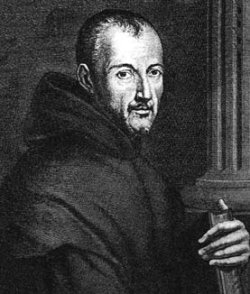Marin Mersenne, Marin Mersennus or le Père Mersenne (September 8, 1588 – September 1, 1648) was a French theologian, philosopher, mathematician and music theorist, often referred to as the "father of acoustics" (Bohn 1988:225).
 Work
WorkIt was written as a commentary on the book of Genesis and comprises uneven sections headed by verses from the first three chapters of that book. At first sight the book may appear to be a collection of treatises on various miscellaneous topics. However Robert Lenoble has shown that the principle of unity in the work is a diatribe against magical and divinatory arts, cabalism, animistic and pantheistic philosophies. He mentions Martin Del Rio's Investigations into Magic and criticises Marsilio Ficino for claiming power for images and characters. He condemns astral magic and astrology and the anima mundi a concept popular amongst renaissance neo-platonists. Whilst allowing for a mystical interpretation of the Cabala, he wholeheartedly condemned its magical application - particularly to angelology. He also criticises Pico della Mirandola, Cornelius Agrippa and Francesco Gorgio with Robert Fludd as his main target. Fludd responded with Sophia cum moria certamen (1626), wherein Fludd admits his involvement with the Rosicrucians. The anonymous Summum bonum (1629), another critique of Mersenne, is an openly Rosicrucian text. The cabalist Jacques Gaffarel joined Fludd's side, while Pierre Gassendi defended Mersenne.
Quaestiones celeberrimae in Genesim (1623)
Mersenne is remembered today thanks to his association with the Mersenne primes. However, he was not primarily a mathematician; he wrote about music theory and other subjects. He edited works of Euclid, Archimedes, and other Greek mathematicians. But perhaps his most important contribution to the advance of learning was his extensive correspondence (in Latin, of course) with mathematicians and other scientists in many countries. At a time when the scientific journal had not yet come into being, Mersenne was the center of a network for exchange of information.
His philosophical works are characterized by wide scholarship and the narrowest theological orthodoxy. His greatest service to philosophy was his enthusiastic defence of Descartes, whose agent he was in Paris and whom he visited in exile in the Netherlands. He submitted to various eminent Parisian thinkers a manuscript copy of the Meditations on First Philosophy, and defended its orthodoxy against numerous clerical critics.
In later life, he gave up speculative thought and turned to scientific research, especially in mathematics, physics and astronomy. In this connection, his best known work is Traité de l'harmonie universelle (also referred to as Harmonie universelle) of 1636, dealing with the theory of music and musical instruments. It is regarded as a source of information on 17th century music, especially French music and musicians, to rival even the works of Pietro Cerone.
One of his many contributions to musical tuning theory was the suggestion of

as the ratio for an equally-tempered semitone. It was more accurate (0.44 cents sharp) than Vincenzo Galilei's 18/17 (1.05 cents flat), and could be constructed using straightedge and compass. Mersenne's description in the 1636 Harmonie universelle of the first absolute determination of the frequency of an audible tone (at 84 Hz) implies that he had already demonstrated that the absolute-frequency ratio of two vibrating strings, radiating a musical tone and its octave, is 1 : 2. The perceived harmony (consonance) of two such notes would be explained if the ratio of the air oscillation frequencies is also 1 : 2, which in turn is consistent with the source-air-motion-frequency-equivalence hypothesis.
See also: Equal temperament.
Other
Bohn, Dennis A. (1988). Environmental Effects on the Speed of Sound. Journal of the Audio Engineering Society 36.4:223-231. Works by Mersenne
Adrien Baillet, Vie de Descartes (1691)
Poté, Éloge de Mersenne (1816)
Gehring, F. (1922) "Mersennus, Marin (le Père Mersenne)", Grove's Dictionary of Music and Musicians (ed. J.A. Fuller Maitland)
No comments:
Post a Comment